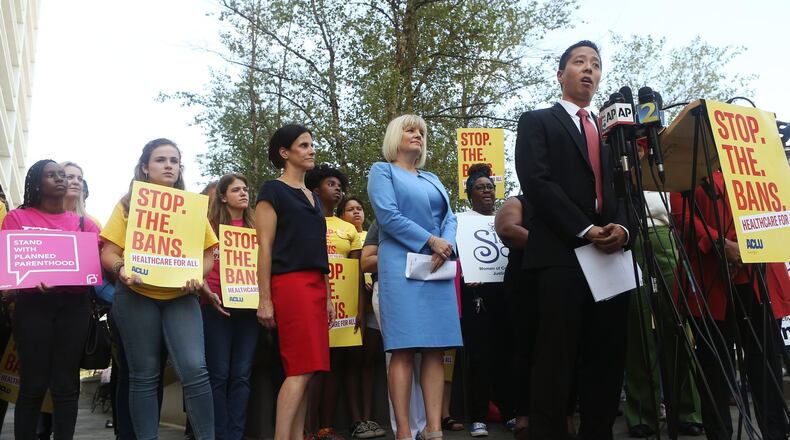Abortion rights activists and providers have formally asked a judge to stop Georgia’s new anti-abortion law from going into effect in January while a lawsuit makes its way through the court system.
The American Civil Liberties Union of Georgia, on behalf of SisterSong Women of Color Reproductive Justice and several abortion providers, filed the request Tuesday — nearly a month after filing a lawsuit challenging the constitutionality of the law.
House Bill 481, scheduled to go into effect Jan. 1, outlaws most abortions once a doctor can detect fetal cardiac activity — usually at about six weeks of pregnancy and before many women know they are pregnant. The law also includes what many supporters call "personhood" language, which extends legal rights to fertilized eggs.
“First, banning abortion prior to the point of viability is blatantly unconstitutional under decades of (U.S.) Supreme Court precedent,” ACLU Legal Director Sean Young told The Atlanta Journal-Constitution. “Second, the provision that purports to redefine personhood is so vague in its application that it is unconstitutional.”
The ACLU is asking the court for a preliminary injunction to stop the new law from going into effect while the June lawsuit works its way through the legal system. The case has been assigned to U.S. District Judge Steve C. Jones.
Georgia Attorney General Chris Carr’s office declined to comment.
Georgia Life Alliance Executive Director Joshua Edmonds, whose group lobbied lawmakers in support of the legislation, said he believed the court would ultimately uphold HB 481.
“This is yet another attempt by the ACLU to roll back the clock on human rights in Georgia,” he said. “We are confident that, by the end of their legal maneuvers to deny protection to innocent children, the courts will agree with a majority of Georgians who resoundingly agree that babies are people and (HB 481) will stand.”
During a press conference Tuesday announcing the request, Young said allowing the law to go into effect would cause “irreparable harm” to those who want an abortion but are not allowed to get one.
“It would put women under physical and psychological harm by forcing them to carry pregnancies to term against their will,” he said.
Governors in Kentucky, Mississippi and Ohio all have signed similar bills. Federal judges have already issued preliminary injunctions against laws in all three states, and similar laws enacted in recent years in Iowa and North Dakota have also been struck down in the courts.
“It’s important for people to understand that the law is not in effect in Georgia, and this is to ensure that the law does not go into effect,” said ACLU of Georgia Executive Director Andrea Young, who is not related to Sean Young.
Supporters of HB 481 hope the lawsuit sets Georgia’s law on a path to overturn Roe v. Wade. The U.S. Supreme Court ruled in 1973 that women nationwide have a right to access abortion up until about 24 weeks of pregnancy. Current Georgia law, passed by the Legislature in 2012, allows abortions through 20 weeks of pregnancy.
In the motion, attorneys for SisterSong, the Feminist Women’s Health Center, Planned Parenthood Southeast, and several private abortion clinics and providers said the new law violates a woman’s right to due process.
“HB 481 imposes on plaintiffs’ patients and members a single and unbending vision of their reproductive trajectories, forcing them to define their lives according to the state’s prerogatives, rather than their own,” attorneys wrote in the motion.
The ACLU is suing Carr, Gov. Brian Kemp, Department of Public Health Commissioner Kathleen Toomey, members of the Georgia Composite Medical Board and its executive director, and the six district attorneys responsible for prosecuting crimes where the plaintiffs reside or operate their businesses.
Any ruling in the case would almost certainly be appealed, and the case could take years to work its way to the U.S. Supreme Court.
About the Author
Keep Reading
The Latest
Featured




